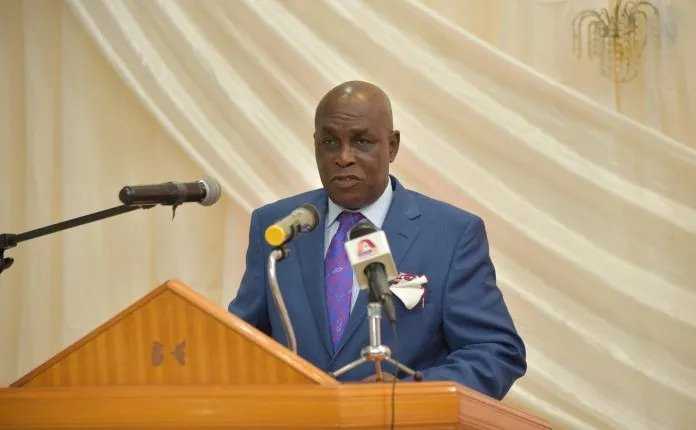The Civil and Local Government Staff Association, Ghana (CLOSSAG), has announced its decision to embark on a strike beginning Thursday, November 7, 2024, citing a prolonged delay in the establishment of a structured salary arrangement for staff members.
In light of this impending strike, labor consultant Mr. Austin Gamey, a seasoned expert in labor relations, provided insights into the ongoing dispute and the potential impact of the strike action.
Austin Gamey expressed skepticism regarding the government’s commitment to resolving the issue and emphasized the importance of collaborative engagement with relevant authorities to design a sustainable pay structure.
CLOSSAG’s announcement follows an extended period of negotiations and consultations regarding a standardized salary structure for civil and local government staff, which has yet to be resolved.
The group voiced its frustration with the slow progress and indicated that the strike is intended to compel government intervention.
However, Austin Gamey questioned the effectiveness of a strike in achieving these objectives, suggesting that systemic issues in Ghana’s salary administration framework may require a more strategic approach.
Government’s Commitment to Question
Austin Gamey highlighted his reservations about the employer’s commitment, indicating that the protracted nature of the dispute reflects a lack of genuine effort by the authorities:
“To be honest with you, I’m not too sure if the [employer in reality], including government as employer, [is] keen in getting labor together for them to have an agreement on how they should manage their salary administration.
This has lingered for too many years, and it’s about time it should be put to rest.”
Austin Gamey Labour Consultant
According to Gamey, addressing the issue requires the government to take decisive action in establishing a cohesive salary structure that effectively serves all stakeholders.
The Role of the National Labor Commission
He explained that the NLCS’s role is limited to facilitating discussions and encouraging parties to negotiate without resorting to industrial action:
“Labor Commission is not having the expertise per se in, you know, designing and making a structure for them. They can only encourage them to go and sit down, to discuss and reach [an] agreement and report back to them. That is about all they can do.”
Austin Gamey Labour Consultant
He stressed that the NLC should focus on bringing relevant stakeholders to the negotiation table, rather than attempting to directly resolve the technical aspects of salary structuring.
Need for External Expertise in Salary Structure Design
Austin Gamey pointed out that one of the core challenges in resolving the salary dispute is the absence of specialized knowledge and resources necessary to create a fair and effective salary structure.
“If the Fair Wages and Labor Commission [do] not [have] the capacity, nothing [stops] them from engaging the services of an expert. Based upon our labor law, they can design a structure that should pay people based on productivity.”
Austin Gamey Labour Consultant
In his view, this approach would provide a sustainable and data-driven framework for salary administration, benefiting both employees and the government.
The Ministry of Finance’s Role and Fair Wages Concerns

CLOSSAG expressed unwillingness to continue negotiations with the Fair Wages and Salaries Commission (FWSC) due to perceived limitations in the agency’s authority to make binding decisions.
He suggested that these ministries should take an active role in coordinating discussions, emphasizing that FWSC’s mandate alone may be insufficient to bring about meaningful change:
“Sometimes the Fair Wages [Commission] does not have the mandate per se. The mandate resides in either the Ministry of Finance in collaboration with [the] Ministry of Employment and Labor Relations.”
Austin Gamey Labour Consultant
He encouraged CLOSSAG to negotiate directly with these ministries, as they hold the ultimate authority to address salary issues, thus potentially leading to a more fruitful outcome.
The Importance of Mediation
“What normally should be done is to get somebody to facilitate this process. It’s doable, and I want to urge them to get together and talk about it because a strike can be very devastating. It is not in the best interest of anybody.”
Austin Gamey Labour Consultant
Austin Gamey expressed concern that a strike could have far-reaching consequences, affecting not only CLOSSAG members but also public service delivery across the country. In his view, collaborative dialogue remains the best course of action.
Austin Gamey’s analysis of the ongoing CLOSSAG salary dispute underscores the complexities surrounding public sector wage administration in Ghana.
He reiterated the importance of comprehensive discussions, with key ministries and skilled experts at the table, to ensure a fair, productivity-based salary structure.
Austin Gamey believes that constructive dialogue, facilitated by qualified professionals, could avoid the potential disruptions a strike may cause and lead to a sustainable solution that meets the needs of all stakeholders.
READ ALSO; Cardi B Addresses Trolls Creating Disturbing Images of Daughter























